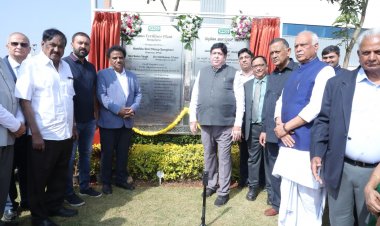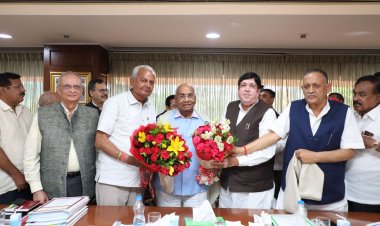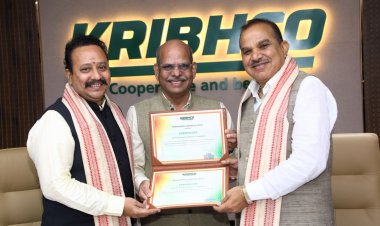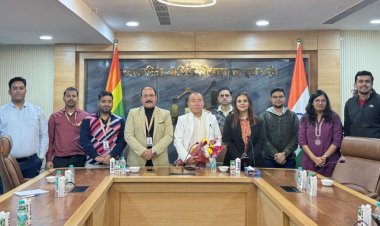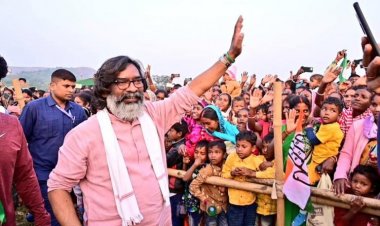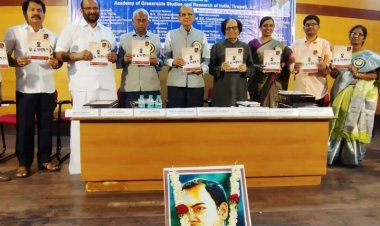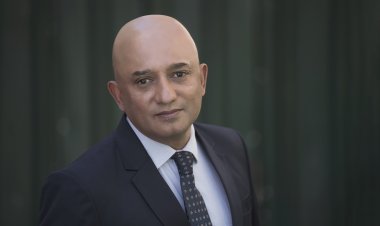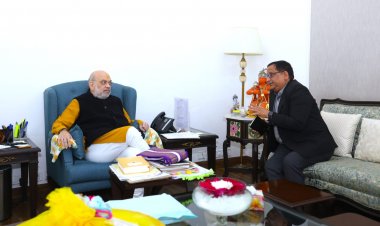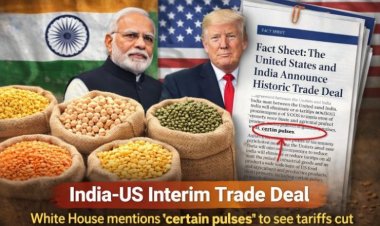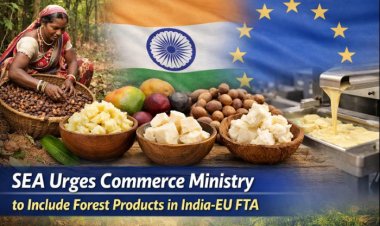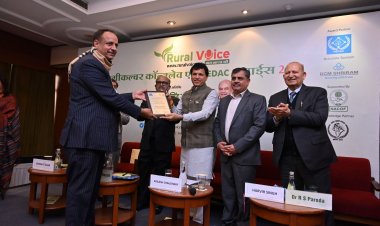Rural Voice Dialogue: Transparency in cooperatives and exploring fundraising options necessary; suggestion to include cooperative in curriculum
Experts suggested in the Dialogue measures like bringing transparency in the functioning of cooperatives, adopting technology to achieve this purpose, raising the incomes of the farmers through cooperatives, exploring new fundraising options, including “Cooperation” in the curriculum to involve the youth and increasing the intervention of cooperatives in the service sector.
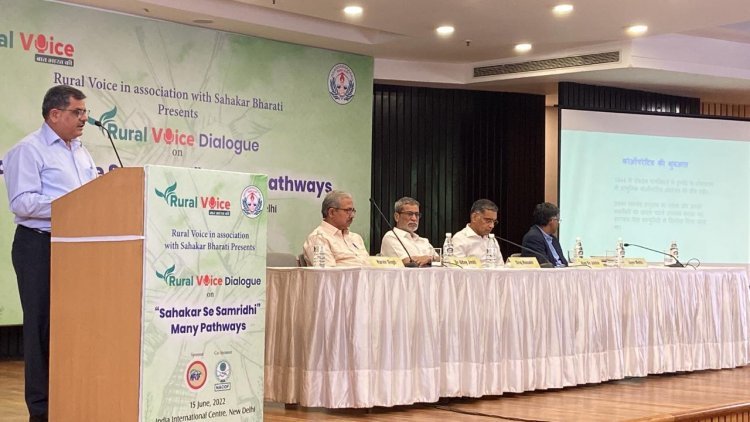
Rural Voice, a media house that focuses on agriculture and rural affairs, presented in association with Sahakar Bharati a Dialogue on cooperatives on Wednesday. Its aim was to identify the challenges that the cooperative movement faces and explore new possibilities to take the movement forward. Several eminent personalities participated in the Dialogue. They suggested measures like bringing transparency in the functioning of cooperatives, adopting technology to achieve this purpose, raising the incomes of the farmers through cooperatives, exploring new fundraising options, including “Cooperation” in the curriculum to involve the youth and increasing the intervention of cooperatives in the service sector.
The Dialogue was on “Sahakar se Samriddhi: Many pathways”. It had three sessions. The first session was held on “Strengthening cooperatives for better income realization”. The topic for the second session was “Global experience in cooperation: How India can benefit”. The third session discussed the “Way forward to make cooperatives relevant”.
Opening the first session, former Agriculture Secretary Siraj Hussain said that the formation of the new Ministry of Cooperation was a good step and the Ministry should aim at bringing transparency to the functioning of cooperatives. He suggested that technology should be used in cooperatives as much as possible. This will make their functioning transparent. Hussain said that while all the Primary Agricultural Credit Societies (PACS) had been computerized in Telangana, this was not the case in Uttar Pradesh (UP) as yet. He said that if there was any sort of muddle in a cooperative, technology would soon bring this to light.
Jayen Mehta, COO, GCMMF, Amul, said that in order to increase the farmers’ incomes, it was necessary that they got higher prices for their produce and minimized the costs. This is the model on which Amul works. Talking about the prospects of dairy cooperatives in India, he said that at present 22 per cent of the world’s milk was produced by India. This would go up to 35 per cent in a decade. Of the incremental production in the next 10 years, India’s share will be one-third. Mehta said that cooperatives could play a significant role in increasing the farmers’ productivity and in reducing their costs.
Dr Uday Joshi, National General Secretary, Sahakar Bharati, said that the members of the cooperatives should work in the spirit of trusteeship. He said that since the formation of the new ministry, there had come several suggestions to amend the cooperative laws. Sahakar Bharati, however, believes that a national policy should be formulated first and amendments should be made only on its basis. This would obviate the necessity of repeated amendments. Dr Joshi said that cooperatives did not attract the required capital investment. The need is to explore the fundraising routes of bonds, debentures, preferential shares, etc. Dr Joshi said that it was necessary to strengthen the PACS to make India a $5tn economy.
Ajay Vir Jakhar, Chairman, Bharat Krishak Samaj, said that it was necessary to train the people associated with cooperatives. He said that NCUI had been formed with this purpose but its work in this field could not be called satisfactory. Most of the officials are simply ignorant of the cooperative laws. There is no transparency at the officer level. These conditions need to be changed. Jakhar said that in order to ensure the success of cooperatives, it was also necessary to understand the reasons why cooperatives had failed.
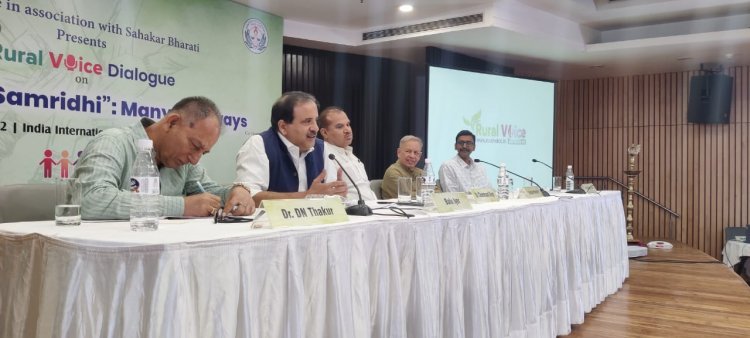
Opening the second session of the Dialogue, Dr Chandrapal Singh, President, International Cooperative Alliance, Asia-Pacific (ICA-AP) and Chairman, Kribhco, said that the country could not become strong without the cooperative movement. He said that the cooperative movement in India was agriculture-based. If agriculture becomes strong, the cooperative movement will also become strong. Talking about the ICA, Dr Singh said that 12 per cent of the world’s population was associated with cooperatives. There are about 30 lakh cooperatives across the world. In order to involve the youth in the cooperative movement, Dr Singh suggested that “Cooperation” should be taught as a subject in higher education. He emphasized the need for training in order to run the cooperatives professionally.
Satish Marathe, Director, Reserve Bank of India (RBI), said that cooperatives could prosper only when they were brought in all three sectors — agriculture, manufacturing and services. He suggested studying the cooperative movements of Germany, France and the Netherlands — the first for manufacturing and the last two for agriculture. He said that it was necessary to increase the engagement between cooperative and banking. He also said that the ownership of a cooperative should be separate from its management that focuses on day-to-day affairs. He suggested to the government that it should regulate the cooperatives, but not micro-manage them. He said that there were huge possibilities for cooperatives to grow in the agro-processing sector.
Konda Reddy Chavva, Assistant FAOR, Food and Agriculture Organization (FAO), spoke about case studies of Japan, Denmark, the Netherlands, New Zealand and France. He said that agriculture cooperatives in Denmark were active in everything from production to marketing. In India, too, the farmers should be engaged at a big level. Citing the example of New Zealand, Chavva said that farmers of the country were running several big businesses and industries.
Balu Iyer, CEO, ICA-AP, said that cooperatives could explore several possibilities in the service sector. He said that the contribution of the services sector to India’s GDP was more than 50 per cent but a large part of it was informal. Citing the example of Capricorn from Australia, he said that 17 auto mechanics had set up a cooperative there. Today, there are 25,000 members and its turnover is $2bn. Iyer also said that fundraising options need to be considered for the cooperatives.
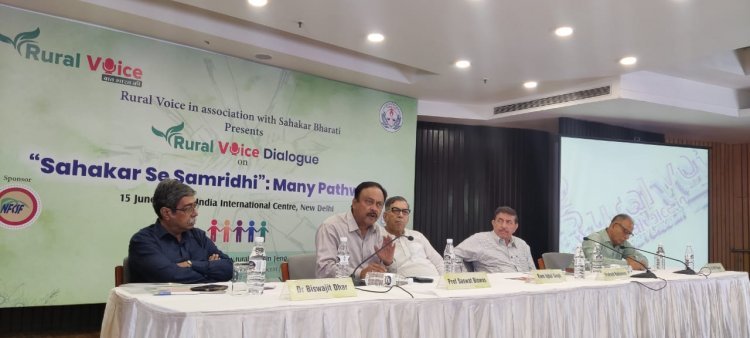
In the third session, Dr Saswata Biswas from IRMA, Anand, emphasized adopting professionalism in the working of cooperatives. He said that he failed to understand why the government should interfere with the cooperatives just because it supported them. This does not happen in the case of private companies. Dr Biswas said that most of the cooperatives functioned in an old fashion even today. The use of technology can bring transparency to their functioning. Dr Biswas also emphasized reforms in cooperative governance.
Speaking about the significance of cooperatives in various sectors, Prakash Naiknavare, MD, NFCSF Ltd, said that sugar cooperatives in Maharashtra not only operated sugar mills but also helped run hospitals, medical colleges, educational institutes, consumer stores, cooperative banks, etc. This can be followed in other sectors and other places, too. Naiknavare, too, raised the issue of lack of professionalism in the functioning of cooperatives and said that this could be addressed through training and technology. He advised sugar cooperatives to proceed with a long-term aim. He said the cooperatives should pay heed to marketing, something that they do not do as of now.
NACOF Chairman Ram Iqbal Singh said that it was important that the government implemented the suggestions being made at the Dialogue. He said that it was virtually impossible for small farmers to reach the government officers and share their problems. Therefore, the cooperative laws need to be relaxed. Emphasizing the role of national and state-level organizations, Singh said that there was no alternative to cooperatives.
Dr DN Thakur, President, Sahakar Bharati, said that cooperatives were never irrelevant and could never be so. Be it food security, energy security or social coordination, it is through cooperatives that these can be ensured. No cooperative has failed so far on its own; rather, the failure has been brought about by external factors. Dr Thakur said that Nature herself functioned on cooperation. It is cooperation that leads to balance in Nature. There cannot be any alternative to cooperatives, said Dr Thakur. The absence of cooperatives will only aggravate problems. It is necessary, however, to go for education, training and awareness to make cooperatives more relevant.



 Join the RuralVoice whatsapp group
Join the RuralVoice whatsapp group

















